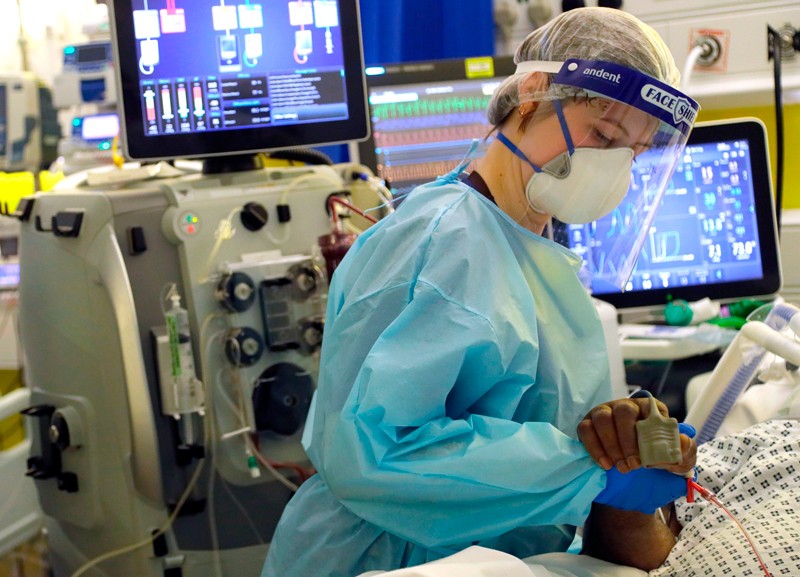SARS-CoV-2 Ongoing Revelations
 |
"Long story short, COVID-19 leads to lasting and possibly permanent changes in immune cells in some, but not all people.""Their white blood cells were unrecognizable compared to healthy donors.""We've learned that this virus, and we can't tell you how, leads to the death of a whole bunch of T cells, and then seems to, at least in some people, lead to damage to the white blood cells they make after that infection.""Once a T cell commits to responding to one thing, it can't respond to anything else. As we age, more and more of them become committed to responding to infections, or all the other things we might be exposed to, and fewer and fewer are available to respond to new threats.""Many, hopefully most people, will be fine. Once you've got T cells committed to the vaccine or the virus, in theory these should be expanded and activated once you are boosted."Dawn Bowdish, Canada research chair in aging and immunity, McMaster UniversityIt could be that SARS-CoV-2 is remaining in the body and causing immune alterations.""[Some groups reported people with even mild infections had symptoms of T cell] exhaustion [and people with multiple infections of COVID had] poorer performing immune memory to SARS-CoV-2.""It was almost as if their T cells were giving up the ghost."Anthony Leonardi, T cell researcher, Boston"Much remains to be learned.""However, I agree with the school of thought that it is preferable to avoid this infection, because of the risks of long COVID and evidence of long-lasting effects."Immunologist Tania Watts, University of Toronto
 |
A
new alert has been raised among the community of scientists absorbed in
the study of SARS-CoV-2 causing COVID and its short- and long-term
effects on the human body and mind. Researchers are facing evidence that
repeated infections with the COVID-19 virus may be responsible for
premature aging of the human immune system. Ontario public health
officials noted recently in an update that evidence is emerging of
SARS-CoV-2 causing "immune dysregulation".
This
is characterized by an immune system that fails to behave normally.
Where it has been observed that white blood cell counts may be degraded,
in that immune cells fail to respond in the manner they normally would,
and inflammation becomes more troublesome than it should be. New
research suggests that T cells that normally aid in the production of
antibodies to kill infected cells, have been modified by COVID.
"A potential increase in acquired impaired immunity in the Ontario population could have significant impact on the incidence and associated burden of infectious diseases -- and other conditions in the longer term."Public Health Ontario brief
 |
Of
concern is that people may be found to be less capable of fending off
pathogens and infections like influenza as a result of COVID infections,
or that an immune system that has become degraded could lead to an
increase in autoimmune diseases such as diabetes. Immune imbalance,
which has been recognized as a key feature of long COVID, an issue that
intrigued Dr. Bowdish, leading her to examine a blood sample from a
hospitalized patient with SARS-CoV-2.
As
a result of research by her team, results of a small study has been
published indicating abnormal white blood cell counts and high
inflammation present even in asymptomatic and mild 'recoverees'. A
problem that is seen to be more pronounced in people with severe COVID
cases. In some instances it was found that blood cells never fully
recover "and seem to generate autoimmune reactions" causing the body's immune system to attack its own tissues.
 |
Lower numbers of "naive" T and B cells (cells producing antibodies)
were found in people who had COVID, in a recent study. Naive cells
represent those not yet responding to an infection and therefore not yet
dedicated to a single-purpose function. Fewer naive T cells is
recognized as a sign of "immune aging", where a level of resilience remains to produce more naive cells "but not an indefinite capacity", points out Dr. Bowdish.
According
to one theory, SARS-CoV-2 hyperactivates T cells leading in severe
cases to overzealous cells causing chronic elevated inflammation
responsible for harm done to the body, according to Anthony Leonardi. A
Boston group reported that people with long COVID had persistent bits of
spike protein in their blood remaining up to a year post diagnosis,
seen as a potential reservoir of infection.
It becomes easier to be reinfected when people with multiple infections of COVID ended up with "poorer performing immune memory to SARS-CoV-2",
explained Dr. Leonardi.Vaccines and boosters are seen still to be
effective against the risk of severe infections. Most people were found
in a review to eradicate the virus, and current vaccines "elicit robust T cell responses that likely contribute to remarkable protection against hospitalization or death", said Dr. Bowdish.
Still, with some people losing naive cells, this may leave them less likely to respond to other viruses or infection "so that's the major concern",
elaborated Dr.Bowdish. Persistent inflammation is a troubling sign, one
that leads people to be more likely to develop cardiovascular problems
or strokes.
 |
Labels: COVID-19, Immune System, Research, SARS-CoV-2, White Blood Cells

<< Home